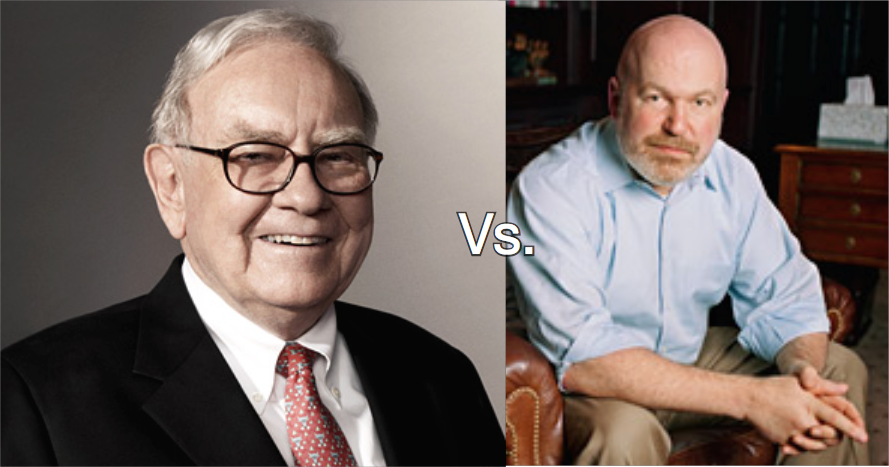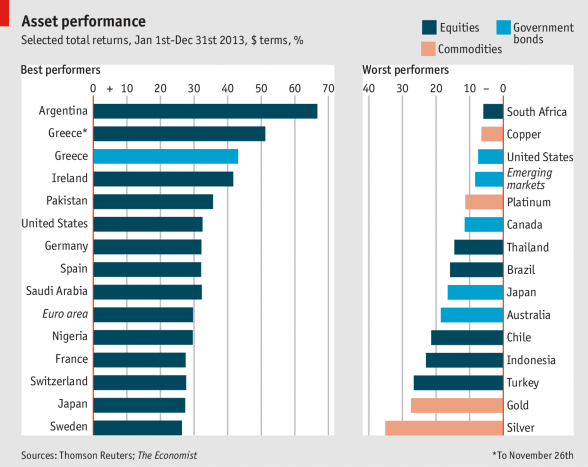Financial news TV shows are a great place to wage philosophical battles, particularly with respect to investing, which tends to gets people’s juices flowing.
Warren Buffett went on CNBC back in May of 2013, and had some choice words for those who would consider investing in bonds:
“In terms of…bonds, some day they will sell the yield a whole lot more than they’re yielding now…I don’t know…when it’ll happen…the question is always when…but you could have interest rates very significantly different than what they are now, in some reasonable period in the future.
…I like owning stocks. I do not like owning bonds now. There could be conditions under which…we would own bonds, but they’re conditions far different than what exist now.
…You shouldn’t be 40% in bonds…I would have productive assets. I would favor those enormously over fixed dollar investments now, and I think it’s silly to have some ratio like 30 or 40 or 50% in bonds. They’re terrible investments now…I bought bonds back in…the early 80s…We made a lot of money and we bought zero coupon bonds…The price of everything determines its attractiveness…You’ve got some guy buying $85 billion a month…and that will change at some point. And when it changes, people could lose a lot of money if they’re in long-term bonds.”
I do not like owning bonds now
Got it, Warren. Don’t buy bonds.
Fast forward five months to October of 2013, when Cliff Assness sat down for an interview with Consuelo Mack, host of WealthTrack, a New York-based business news program that airs on public television:
Consuelo Mack:
[What is] one investment for a long-term diversified portfolio? What would you have us all own some of?
Cliff Asness:
“I am going to be very counterintuitive, and this is not a forecast. I am actually picking an expensive investment, one more expensive than stocks. I’m going to pick the bond market. And I don’t want anyone to listen to your show and go ‘god, Asness’s forecast – he loves bonds!’ Having said that, people understate the power of diversification.
Take the 1970s. The 1970s was a disastrous period for bonds (the decade). A portfolio that took equal risk in stocks, bonds, and commodities, something like we might prefer, did better than all stocks, and it had way more bonds.
Consuelo Mack:
In the 70s?!
Asness:
In the 70s. One thing: commodities were strong, which helped, which in an inflationary period, …when you’re really going to see your bond disaster, is not a certainty, but is not a bad bet, I think.
Second, the power of diversification is that strong…having three different horses even if one doesn’t work. You know, if you commit yourself to diversification…the glass is half empty way to view it is you’re always in the worst thing, but the glass is half full way is you’re always in the best thing. Turned out to be commodities that decade.
If you look over the long term, we think balanced risk [can make sense], even when rates mildly rise. We look at periods from the 40s to the 80s. You know your interest rate[s], they mildly rose, and then they shot up in the 80s, and they’ve been coming down ever since until very recently. Even over that rising period, having a relatively equal amount of risk in bonds, not even dollars, worked better than traditional approaches. So this is not a short term forecast. I am certainly not sitting here telling your viewers, ‘here is an undervalued asset – bonds.’
Mack:
But don’t abandon bonds, and always have a portion in your portfolio.
Asness:
Exactly. And I love it because it’s counterintuitive, and it gives me a chance to beat to death what is almost always our most important theme: diversification beats timing.
Diversification beats timing
So who is right? Is it silly to have some portion of bonds in your portfolio, or does diversification beat timing?
Copyright © Turnkey Analyst














